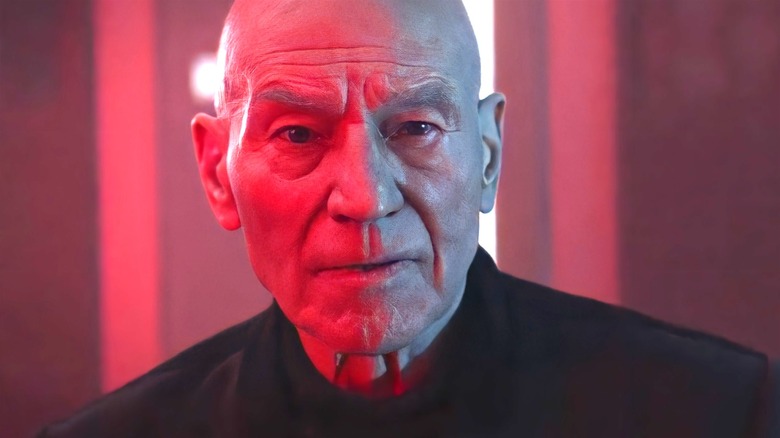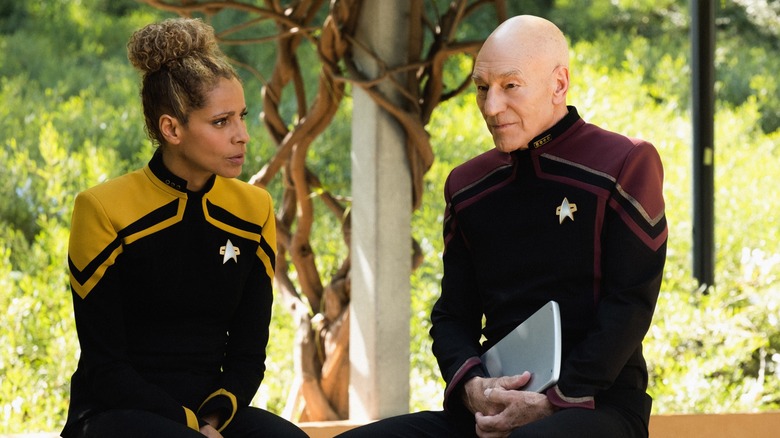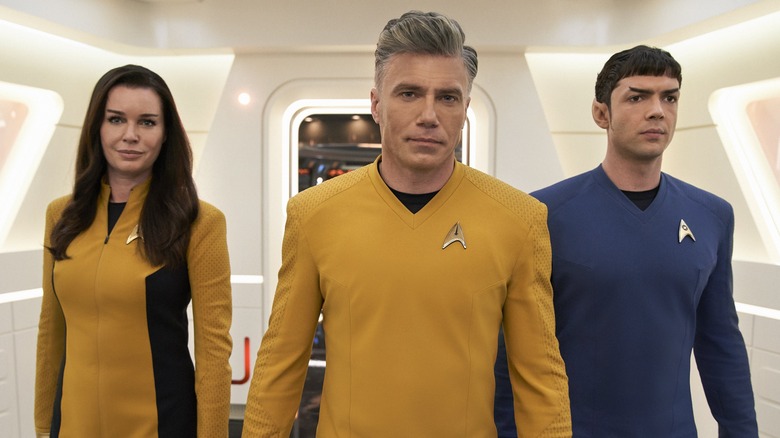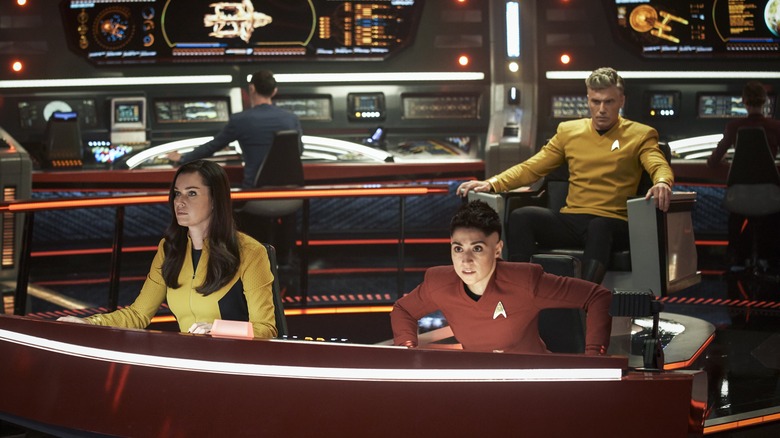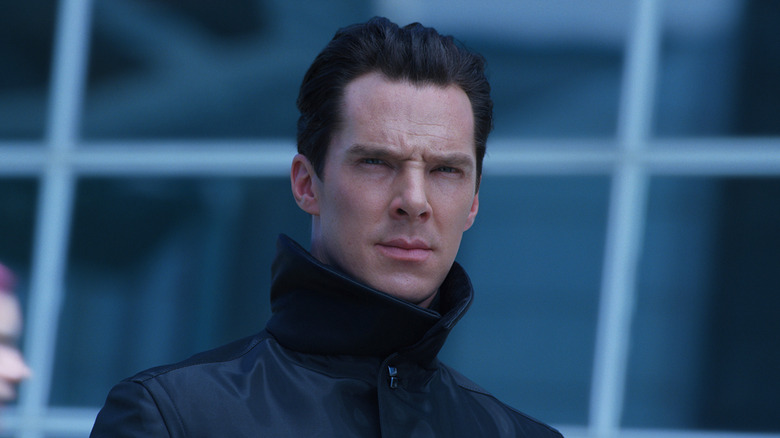Star Trek Needs A Next Generation-Style Reboot (Or It'll Be Frozen In The Past)
Space: that thing that was a frontier until "Star Trek" became so bloated that every parsec was charted. Okay, maybe not every parsec, but the point stands. Through ups and downs in the last 20 years or so, "Star Trek" has managed to remain a potent force in pop culture. But it isn't exactly the titan it once was, and its universe is running dangerously low on places no one has gone before.
Despite pumping out more content now than ever before, the "Star Trek" franchise isn't necessarily on its strongest footing. Paramount has made major efforts to diversify the brand across both streaming releases and traditional TV, but that cluster-bomb method hasn't yielded as many huge hits as the studio likely was hoping for. "Star Trek: Picard" has received an uneven reception, "Discovery" failed to capture the same cultural clout as its biggest predecessors, and "Lower Decks," while popular, isn't exactly the kind of show that's going to put "Star Trek" next to the Marvel Cinematic Universe.
The biggest thing the franchise has going for itself right now is probably the "Discovery" spin-off "Star Trek: Strange New Worlds," which had a universally praised Season 1 and is approaching its Season 2 premiere on June 15. In a way, "Strange New Worlds" can be seen as a soft reboot for the franchise, but for all that it does well, it still isn't enough to carry the weight of the entire brand. If "Star Trek" wants to remain relevant moving forward, it needs a proper, full-on reboot akin to "The Next Generation."
The new Star Trek shows are too dependent on the past
"Star Trek" has encountered the same core problem that's starting to plague "Star Wars" and the MCU. In the effort to make it a massive transmedia project — even more so than it's always been — Paramount has made the entire franchise intimidatingly huge for newcomers. Even many longtime fans don't keep up with everything as there's simply too much coming out.
That's not a problem if each individual project is accessible on its own, which "Lower Decks" and "Strange New Worlds" arguably are. But even in those series, the expansive history "Star Trek" casts a long shadow. "Strange New Worlds" is a spin-off of "Discovery" and plays with some of the same contemporary "Trek" plot devices. That's in addition to its primary status as a sort of prequel to the original series. And even "Lower Decks," which is so goofy that it can barely be counted as part of the main franchise story, relies on a familiarity with the tropes and lore of everything that came before.
The modern media franchise model is like a neverending rug. As it rolls up, every new addition is taken in and then eternally run through again and again in the cycle. Eventually, there are so many repeating layers that new viewers need a wiki deep dive just to get the gist. Even the last "Star Trek" film trilogy — the dictionary definition of a reboot – refused to fully cut itself off from the canon. Heck, if you didn't see "The Wrath of Khan" before "Into Darkness," you'd miss about 30% of the significance.
Getting into Star Trek now is next to impossible
Where would you suggest someone start if they wanted to get into "Star Trek?" Should they watch a few episodes of the original series first? Or maybe just jump right into "Strange New Worlds" Season 1? Maybe they should watch "The Next Generation" first since it set the stage for the modern franchise. Maybe watching the Chris Pine movies would actually be the easiest way in.
That's just the thing, though: There is no clear answer. "Star Trek" is a dense property that's focused more on fan service in recent years than on bringing in new fans. And beyond just the quandary of where to start, there's the thick aesthetic of the franchise. "Star Trek" presents a very specific brand of science fiction. There are captains and ships, crews and Starfleet facilities, and a longstanding model of episodic, philosophy-driven storytelling.
Not all of those familiar traits are barriers for newcomers. "The Next Generation" took plenty of cues from the original series while still being a great new starting point. But if you're someone who's bounced off of "Star Trek" in the past, there's not much in the new shows that offers you a different way in.
The franchise needs a dramatic style shift
Close your eyes and picture "Star Trek." Without even having a specific era or medium in mind, you probably already have a pretty vivid image. That hyper-legible nature is one of the strengths of the franchise, but it can also be a hindrance.
If Paramount wants to make the franchise a global name on par with Disney's biggest brands, it needs to diversify the aesthetic and approach. Put simply, "Star Trek" needs a style shift and a proper reboot to make it happen. Just like how "The Next Generation" launched things into the future and fully revitalized the universe, a full-on modern reboot (not a spin-off, prequel, or animated series) could throw things forward once again. Maybe we finally get out of the Milky Way and start exploring other galaxies. Maybe there's such a dramatic time jump that Starfleet as we know it no longer exists. Regardless, we need something, anything, that doesn't have yet another Mr. Spock. Please, Paramount, let the man rest.
Of course, any big deviations from such an established tradition would undoubtedly draw criticism from some fans. There will always be those who want a neverending repetition of the same old styles over and over. And, for those people, there's good news: That will surely still be part of the future of "Star Trek." We can have our nostalgia, our familiarity, and also have a proper reboot to bring in new fans. Let's be honest, "Trek" has never shied away from doing many (maybe too many) things at once.
What a proper Star Trek reboot could look like
Whatever a new "Star Trek" reboot might look like, it should use "The Next Generation" as a baseline. No other attempt to reestablish the franchise for a new audience has worked half as well. So what did "The Next Generation" do? It introduced a whole new era that was connected but untethered to the original series. It introduced new, unique races and characters to drive the story like Q and the Borg. And it didn't feel obliged to merely copy its predecessor, casting a very different captain and changing the whole feel of the Enterprise itself.
By today's standards, "TNG" might not seem like such a major departure from the original "Star Trek," but in its day, it absolutely was. That's what the franchise needs now if it wants to continue growing: a new angle that will make regular folks take notice and actually get people talking. Maybe that means taking the animated experience of "Lower Decks" and "Prodigy" and applying it to a serious, adult-oriented story. Maybe it means leaping so far into the future that no fan could possibly know the rules of the universe anymore.
Of course, you don't want to completely lose the core "Trek" identity, but establishing a series that isn't so reliant on the "Starfleet captain and their ship" model could go a long way. Ultimately, "Star Trek" is supposed to be about discovering the unknown. Not even the show titled "Discovery" could make that happen again, but it is possible if enough big risks are taken.
